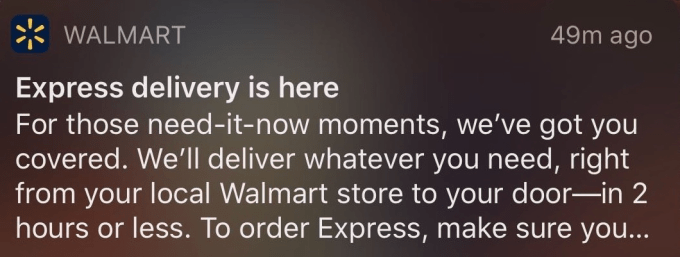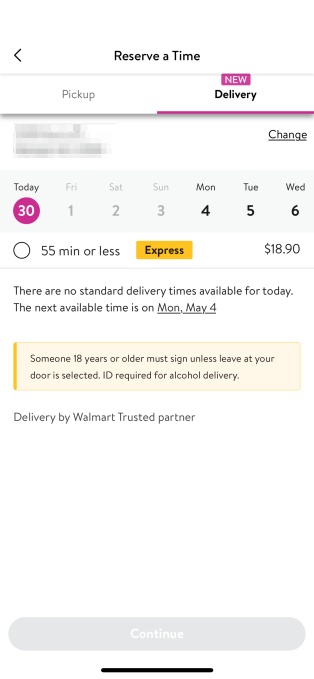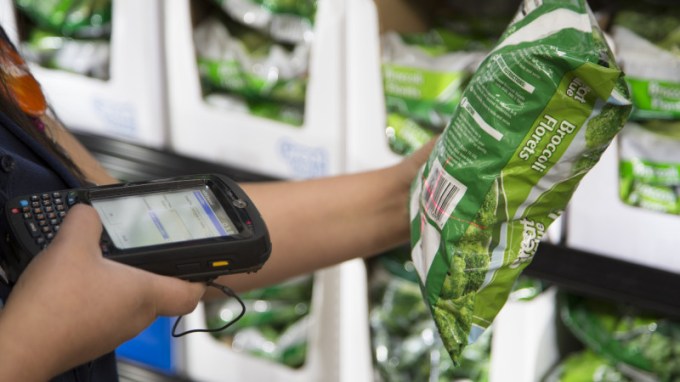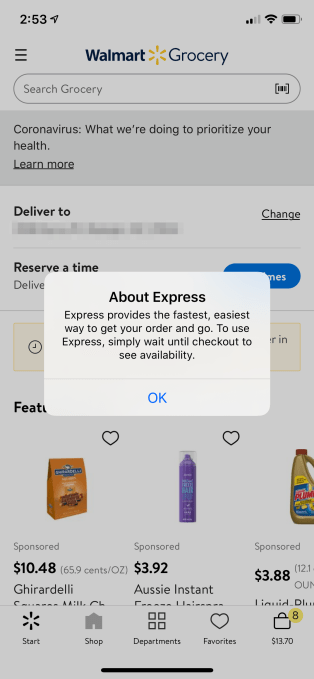Record usage of grocery delivery services amid the COVID-19 pandemic has led to delayed orders, fewer open delivery windows, and an inability to even book a delivery time slot, on occasion. Walmart now hopes to capitalize on the increased demand for speedier delivery with the introduction of a new service that allows consumers to pay to get to the front of the line. The retailer confirmed today it’s launching a new Walmart Grocery service called “Express” which promises orders in 2 hours or less for an upcharge of $10 on top of the usual delivery fee.
The service has been in pilot testing across 100 Walmart stores in the U.S. since mid-April.
Some Walmart customers may have recently received a push notification alerting them to the launch.

To use Express delivery, you first fill your online Walmart Grocery cart with the $30 minimum required for delivery orders or more. At checkout, you’ll see an option beneath the calendar where you pick a delivery date to select the Express service. In many cases, there may no other standard delivery time slots available for the current day or even several days out, which makes the Express service even more appealing to shoppers who need their orders sooner.
Though Walmart is officially promoting Express as a “two-hour” delivery service, in the weeks it’s been piloting the program Walmart has been able to deliver these orders within 56 minutes, on average.
In our tests, we were shown an Express fee of $18.90 to receive a delivery in “55 mins or less,” the app informed us today, April 30. There were no other fees. Without choosing the Express option, the next available time slot was not until next week, on Monday, May 4.

A price of $18.90 is close to — but is not exactly — a $10 increase over Walmart’s typical delivery fees of $7.95 or $9.95, depending on time of day. But we understand the plan is to make Express a flat $10 upcharge moving forward. (Walmart hadn’t been planning to officially announce the launch until next week, so pricing is being updated.)
Like Walmart’s other grocery deliveries, Express deliveries are handled by Walmart’s external network of delivery partners, which vary by market. The retailer won’t comment on if those additional fees are split with their partners, or how, if so.

There could be backlash against a system like this, given how it favors a wealthier customer at a time when food and other critical supplies have run short. During the pandemic, store shelves have often been bare as consumers hoarded things like toilet paper, hand sanitizer, and Lysol cleaners. Now, consumers are being warned that meat shortages are expected soon.
In addition, the pandemic has already exposed the income divide between those who can afford to shop online and low-income customers, who can only use their SNAP benefits (food stamps) in physical stores — except in a handful of states where a USDA pilot has been running. And now those with the means will be able to gain another advantage: paying to get to the limited supplies first.
Walmart says it’s doing things to mitigate these types of concerns, however.
For items where the inventory is so limited it can’t guarantee delivery, it’s removing their availability from the online grocery service. Plus, the retailer says it’s not pushing back standard delivery orders to accommodate the high-paying Express customers. Instead, the Express service is being made available on top of Walmart’s existing grocery pickup and delivery capacity.

The Express service wasn’t dreamed up because of the pandemic, Walmart says, but it did play a role in terms of the timing of the launch.
“The demand that we’ve seen during the coronavirus pandemic is making us push forward and expedite the development of some services that we may have been thinking about,” a Walmart spokesperson explained. “But demand has pushed us to innovate more quickly,” they added.
Walmart is not alone in experiencing a crush of online grocery orders due to the COVID-19 pandemic.
The company and others have seen a record number of downloads for their grocery apps in recent weeks. In fact, demand for online grocery as well as other e-commerce orders has been so great that Walmart hired 150,000 new workers out of a pool of over a million applicants a full six weeks ahead of schedule, and is now hiring 50,000 more.
Meanwhile, Walmart’s online grocery rivals — Shipt, Instacart and Amazon — have also been hiring hundreds of thousands of new shoppers between them. Amazon had to implement a waitlist system for new Amazon Fresh and Whole Foods Market pickup and delivery customers due to the rise in online grocery shopping. And Instacart made several adjustments to its app to help better prioritize orders and open up more delivery windows.
In Walmart’s case, its ability to launch Express isn’t solely due to its new hires, we’re told.
The company already employs a workforce of “personal shoppers” who dedicate themselves to pulling for online grocery orders. Walmart says Express is powered by these personal shoppers, only some of which may be the newly hired store associates.
Walmart intends to test Express in its pilot markets before rolling out the service further across the U.S.
 from eCommerce – TechCrunch https://ift.tt/3bQMngg
from eCommerce – TechCrunch https://ift.tt/3bQMngg via IFTTT
via IFTTT
No comments:
Post a Comment